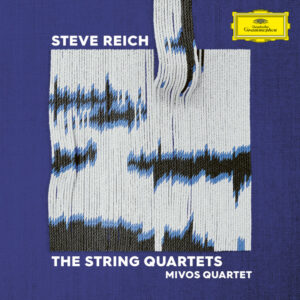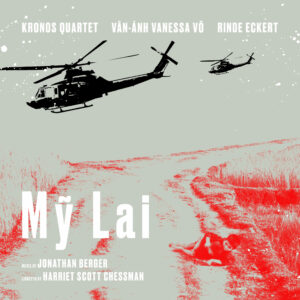Steve Reich: The String Quartets
Mivos Quartet
Deutsche Grammophon
Steve Reich wrote his three string quartets for the Kronos Quartet, who have premiered, recorded (for Nonesuch), and continued to champion them. With Kronos still active, why does another quartet record these pieces? Mivos Quartet makes a strong case that there is room for other interpretations of Reich’s string quartets.
I remember well being at the Carnegie Hall premiere of Steve Reich’s piece for string quartet and multimedia WTC 9/11, performed by Kronos Quartet. Its incorporation of sound recordings, a dead phone line, air traffic controllers, and those trying to escape the building, was harrowing. Like his first quartet, Different Trains, Reich creates instrumental motives out of spoken word passages, imitating their contour and imparting pitch. The final movement, in which Jewish prayers are said over remains from the site, is extraordinarily moving. By the end of the work, many in the audience were visibly shaken by its visceral impact. Kronos has since recorded WTC 9/11, in a gritty rendition reminiscent of the energy of the live performance.
Mivos plays with equal poignancy, but also with a laser beam clarity that brings an entirely different palette of textures to bear. The recorded voices too have been remastered to emphasize incisiveness of utterance. Even with the constraints of overdubbing and vocal samples, there is freshness to Mivos’s approach to phrasing, taut and lithe.
Triple Quartet features three quartets overdubbed throughout the piece (no vocal samples). Mivos play up the polyrhythms that festoon the work. Just when you think the groove is interlocked for good, Reich throws another intricate rhythmic relationship into the mix. Lest things become too motoric, glissandos and solo turns enliven the texture. Triple Quartet doesn’t have the narrative arc that defines the other pieces here, but it is a fine piece of abstract music
Different Trains is an iconic work. At the beginning of the Second World War, Reich was shuttled back and forth on trains between separated parents. The “different trains” are those destined for the death camps in Poland. Its first movement features voices from Reich’s train rides, a porter, and governess, and clangorous train sounds. As in WTC 9/11, Reich creates melodic phrases that mimic the contours of the sampled speeches. The second movement is terrifying, with speakers who are survivors of the Holocaust describing their trips on trains to the death camps. Air raid sirens are added to the train sounds, which move on a different polyrhythmic pathway. The final movement describes the end of the Second World War, bringing voices from America and Europe together to consider what has transpired. The last section moves from the emphasis on rhythm to a major key cadence accompanying the description of a deportee with a beautiful voice. One of the masterpieces of the late twentieth century, Different Trains is a piece that delves into issues of ethnicity and religious persecution that are, sadly, all too present in today’s society.
The renditions by Kronos are irreplaceable, but Mivos creates compelling complementary readings. Recommended.
-Christian Carey








